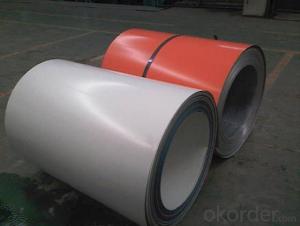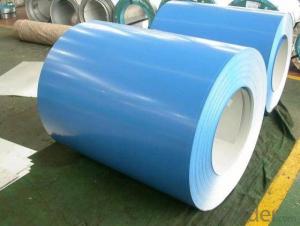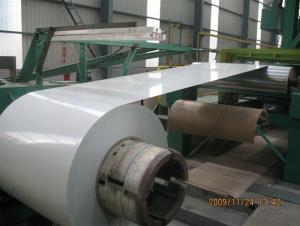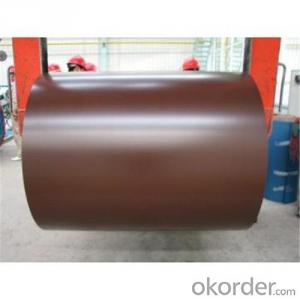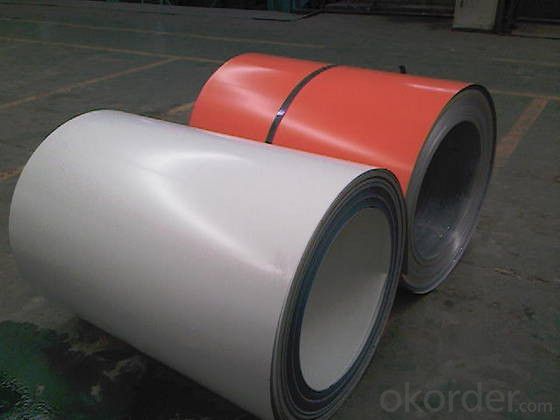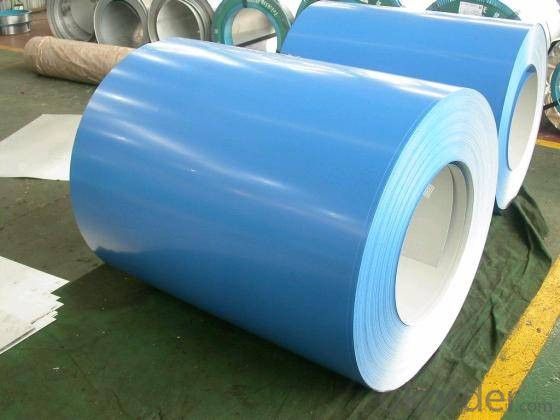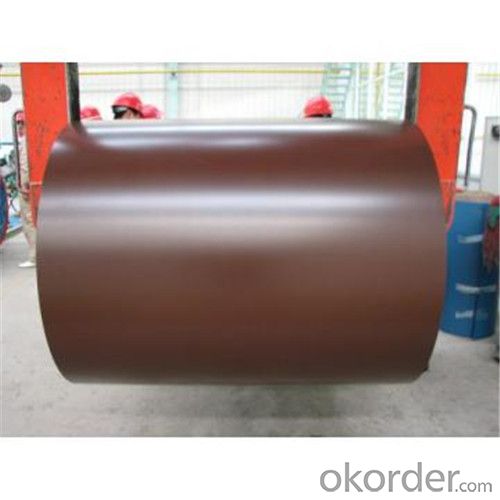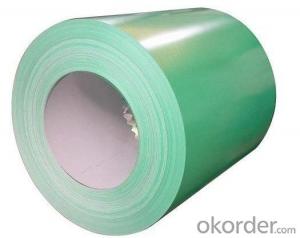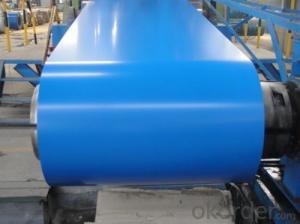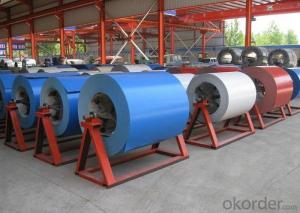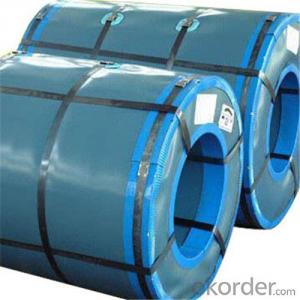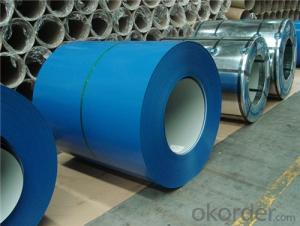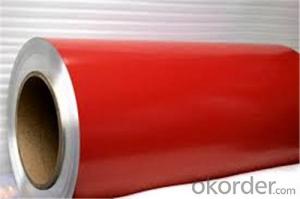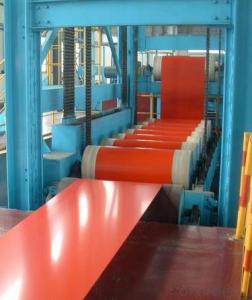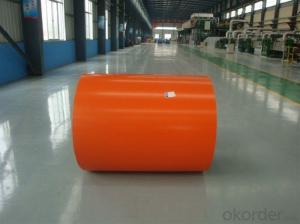prepainted Rolled Steel Coil For Construction Roofing Constrution
- Loading Port:
- Shanghai
- Payment Terms:
- TT OR LC
- Min Order Qty:
- 50 m.t.
- Supply Capability:
- 30000 m.t./month
OKorder Service Pledge
OKorder Financial Service
You Might Also Like
Structure of Prepainted Rolled steel Coil for Construction Roofing
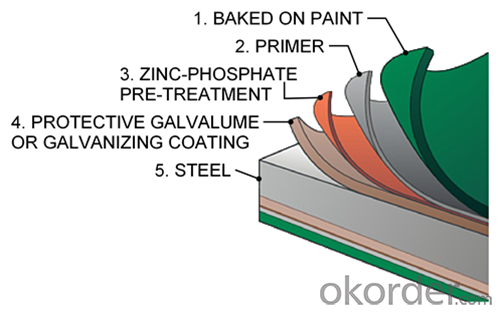
Description of Prepainted Rolled steel Coil for Construction Roofing
Prepainted Rolled steel Coil is a kind of coated steel coil/sheet. With the cold rolled steel of different strength and thickness as substrate, it is produced through applying Al-Zn coat on both faces by hot dip process. In its coating, Al accounts for about 55%, Si 1.6%, while the remaining is Zn. Aluminum zinc coils enjoys both the physical protective feature and durability of Al and the electrochemical protective property of Zn. And its surface has bright silver color and regular embossed-like figure, which are highly decorative.
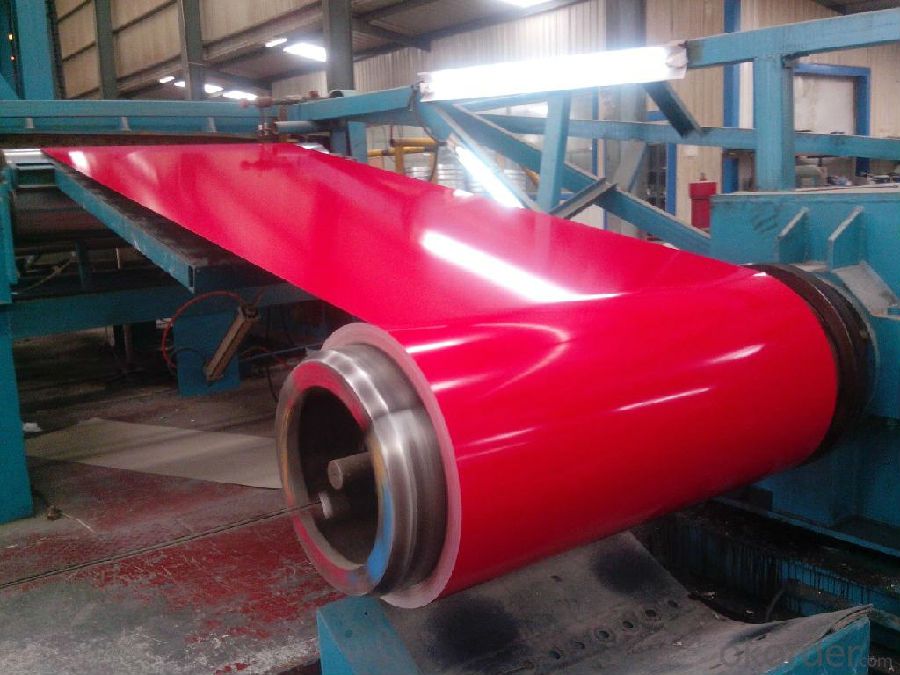
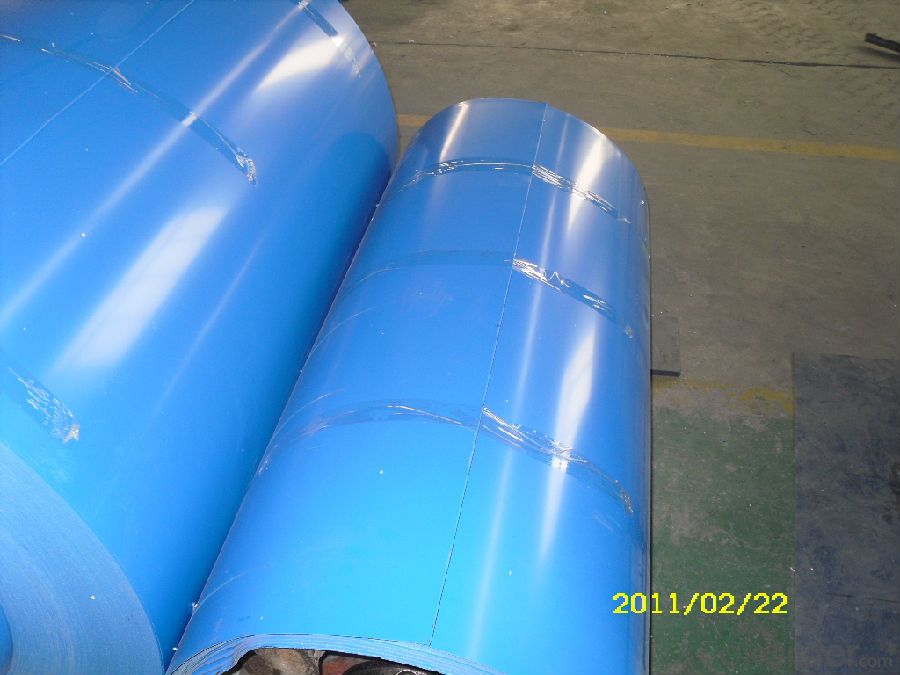
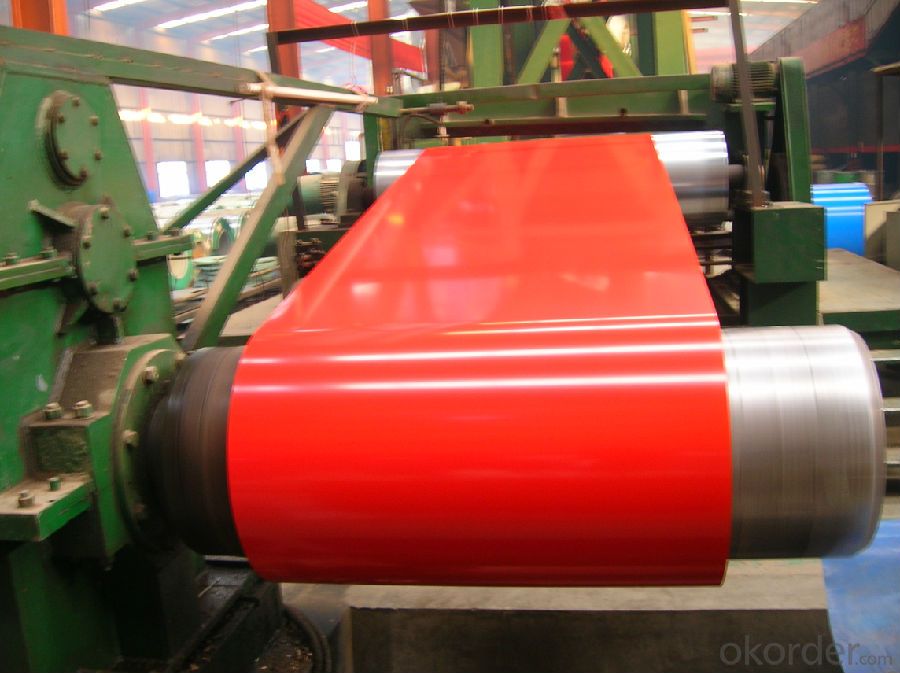
Main Feature of Prepainted Rolled steel Coil for Construction Roofing
1.Corrosion resistance: It mainly depends on the aluminum protection. When the zinc being worn, the aluminum will form a dense layer of aluminum oxide, resist corrosion material to prevent further corrosion inside.
2. Heat resistance: Aluminum zinc alloy steel sheet has excellent heat resistance, can withstand high temperatures over 300 centigrade, and is similar with aluminized steel high temperature oxidation resistance. It often used in chimney pipes, ovens, fluorescent lighting device and the device cover.
3. Heat reflective: Galvanized steel plate heat-reflective high rate is twice as galvanized steel, often used to make insulation materials.
4. Economy: Because density of 55% AL-Zn is smaller than the density of Zn, so in the same weight and thickness of Galvanized zinc layer, aluminum-zinc steel plate is larger area more than 3% of galvanized steel sheet.
Applications of Prepainted Rolled steel Coil for Construction Roofing
1. Construction and building: roofing; ventilating duct; handrail; partition panel;etc.
2. Electric appliance: refrigerator; washing machine; refrigerator; DVD;etc.
3.Transportation: oil tank; road sign; etc.
4.Agriculture:barn; etc.
5.Others:vending machine; game machine; etc.
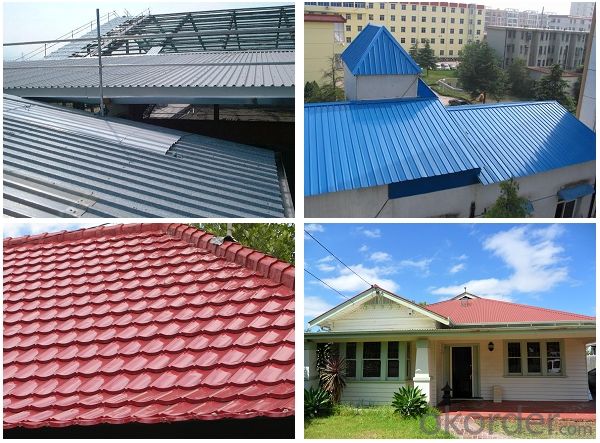
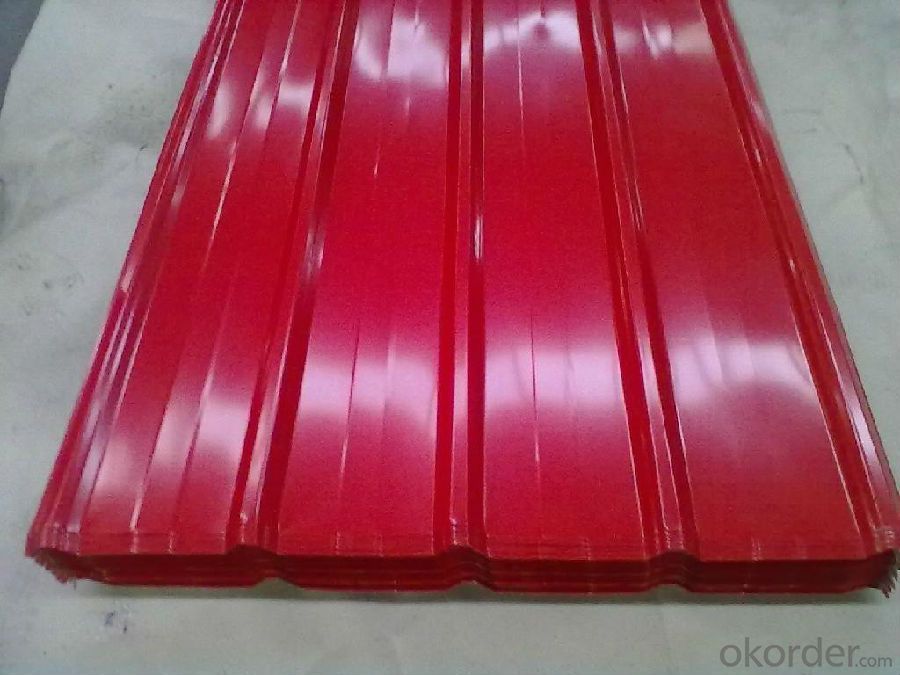
Specifications of Rolled steel Coil for Construction Roofing
Product | Prepainted Rolled steel Coil for Construction Roofing |
Material Grade | SGCC / SGCH / DX51D+AZ, etc |
Thickness | 0.2-3.0mm |
Width | 600-1500mm |
Tolerance | Thickness: +/-0.02mm , Width:+/-2mm |
Zinc-coating | AZ40-150g/m2 |
Technique | Raw material: Hot rolled steel coil --> Cold rolled_>hot dipped galvalume |
Surface | Dried, Chromated, Unoiled |
Spangle | Regular spangle , small spangle, zero spangle |
ID | 508MM |
Coil weight | 10MT max |
Export package | Cardboard inner sleeves, Waterproof paper, galvanized steel covered and steel strip packed |
FAQ of Prepainted Rolled steel Coil for Construction Roofing
We have organized several common questions for our clients,may help you sincerely:
1. What is the minimum order quantity ?
Our MOQ is 50mt for each size. And we will consider to give more discount if you make big order like 1000 tons and more. Further more, the more appropriate payment term your offer the better price we can provide.
2. How long can we receive the product after purchase?
Usually within thirty working days after receiving buyer’s advance payment or LC. We will arrange the factory manufacturing as soon as possible. The cargo readiness usually takes 15-25 days, but the shipment will depend on the vessel situation.
3. How to guarantee the quality of the products?
We have established the international advanced quality management system,every link from raw material to final product we have strict quality test;We resolutely put an end to unqualified products flowing into the market. At the same time, we will provide necessary follow-up service assurance.
- Q: What are the challenges in coil slitting for narrow strip widths?
- Coil slitting for narrow strip widths presents a number of challenges. One key challenge is the need to maintain precision and accuracy throughout the slitting process. Even the smallest misalignment or deviation can result in significant defects or inconsistencies in the final product. Therefore, it is important to calibrate and adjust the slitting equipment carefully to ensure accurate cuts. Another challenge is the risk of material damage or deformation during slitting. Narrow strip widths are more susceptible to distortion, wrinkling, or edge cracking, especially if the material is not handled or supported properly. To minimize potential damage, it is necessary to feed the material smoothly through the slitting machine and control the tension effectively. In addition, handling and transporting slit coils can be challenging due to their narrow width. These coils are prone to bending, twisting, or telescoping, which can cause difficulties in stacking, storage, or transportation. To maintain the shape and integrity of the coils, proper packaging and handling techniques must be employed throughout the supply chain. Furthermore, narrow strip widths often require more frequent blade changes during slitting. This adds complexity and time to the setup and maintenance process, as the blades need to be carefully selected and replaced for optimal cutting results. Skilled technicians are crucial for efficiently and effectively handling these blade changes. Overall, while coil slitting for narrow strip widths offers cost savings and increased material utilization, it also comes with challenges that need to be addressed. These challenges include maintaining accuracy, preventing material damage, ensuring proper handling and transportation, and managing blade changes effectively. By understanding and addressing these challenges, manufacturers can optimize their coil slitting operations and produce high-quality narrow strip products.
- Q: Should I stick with the all steel kit over the acrylic tapers and steel plugs? or would the acrylic be ok? I keep hearing that steel is the best and acrylic can cause problems. I just want to do it correctly and take my time with it, no rushing.thanks
- I haven't heard anyone complain about using acrylic so I don't see why it would be a problem. Either would be fine. I prefer acrylic myself but it really doesn't matter.
- Q: I'm a hiker and cook on a camp fire with a canteen cup. So which would be a better material for cooking on a campfire with, aluminum or stainless steel?
- I added a few more pieces. Love the glass lids. I have a couple pieces of Le Creuset, but it is too heavy even before the food goes in and I don't like dealing with it. I regret buying the Le Creuset now---should have just bought the Lodge Enameled Cast Iron stuff for about a fourth of the cost. I do have a Lodge 5 qt. dutch oven that I use to deep fry and it is a nice piece and easy to clean. The LC dutch oven does a nice job when I want stew-type recipes.
- Q: What are the common applications of pre-painted steel coils?
- Pre-painted steel coils, also known as pre-coated steel coils or color coated steel coils, are widely used in various industries due to their versatility and durability. Some of the common applications of pre-painted steel coils include: 1. Construction: Pre-painted steel coils are extensively used in the construction industry for roofing, wall cladding, and building panels. The color options available in pre-painted steel coils allow architects and designers to create aesthetically pleasing structures. 2. Automotive: Pre-painted steel coils are used in the automotive industry for manufacturing car bodies, interior panels, and various other parts. The corrosion resistance and excellent finish provided by pre-painted steel coils make them a preferred choice in this industry. 3. Appliances: Many household appliances like refrigerators, washing machines, and air conditioners use pre-painted steel coils for their outer panels. The attractive colors and textures available in pre-painted steel coils help enhance the appearance of these appliances. 4. Electronics: Pre-painted steel coils are also used in the electronics industry for manufacturing cabinets and casings of electronic devices like computers, televisions, and audio systems. The protective coating on pre-painted steel coils helps protect the electronic components from environmental factors. 5. Furniture: Pre-painted steel coils find applications in the furniture industry for manufacturing cabinets, shelves, and other similar products. The wide range of colors and finishes available in pre-painted steel coils allows furniture manufacturers to create visually appealing and durable products. 6. Signage and Advertising: Pre-painted steel coils are commonly used in signage and advertising applications for manufacturing display boards, billboards, and signages. The vibrant colors and weather-resistant properties of pre-painted steel coils make them suitable for outdoor use. 7. Industrial Equipment: Pre-painted steel coils are utilized in the manufacturing of industrial equipment such as storage tanks, HVAC systems, and machinery components. The corrosion resistance and high strength of pre-painted steel coils make them suitable for these demanding applications. In summary, pre-painted steel coils have a wide range of applications in various industries such as construction, automotive, appliances, electronics, furniture, signage, and industrial equipment. Their durability, corrosion resistance, and aesthetic appeal make them a popular choice for manufacturers across different sectors.
- Q: How are steel coils used in the production of metal ceilings?
- Steel coils are used in the production of metal ceilings as they serve as the raw material. The steel coils are processed and shaped into the desired dimensions and patterns before being installed as ceiling panels.
- Q: I am looking at website on google based on the terms structural steel fabrication and simply steel fabricationI know that there must be a difference between the two terms, but it seems that many website authors use the two terms interchangeably.Do you know the key differences between the two terms?
- Structural steel is steel construction material, a profile, formed with a specific shape or cross section and certain standards of chemical composition and strength. Structural steel shape, size, composition, strength, storage, etc, is regulated in most industrialized countries. Fabrication, when used as an industrial term, applies to the building of machines, structures and other equipment, by cutting, shaping and assembling components made from raw materials. Small businesses that specialize in metal are called fab shops. Steel fabrication shops and machine shops have overlapping capabilities, but fabrication shops generally concentrate on the metal preparation, welding and assembly aspect while the machine shop is more concerned with the machining of parts.
- Q: I was wondering if anyone knew the grade/type of steel for this product. I'd like to use it as stock for a knife blade, but would like to know the specs so I can determine if it is suitable and, if so, how best to heat treat it.Thanks.PS: I know it isn't stainless, but that leaves a lot of other steel types.
- 1018 mild steel. Not suitable for bladesmithing. If you can't heat treat find an old file, grind it out (keep it cool) and put in an oven 400F. Modern car/truck springs are 5160 med chrome steel, a good blade quality steel and forgiving on the anvil/heat treat.
- Q: How are steel coils cleaned?
- Steel coils are typically cleaned using a combination of processes such as chemical cleaning, mechanical cleaning, and/or high-pressure water blasting. The specific method used depends on the type and extent of dirt or contaminants present on the coils. Chemical cleaning involves applying specialized cleaning agents to dissolve and remove dirt, oil, or other substances. Mechanical cleaning may involve scrubbing or brushing the coils to physically remove debris. High-pressure water blasting is often employed to remove tough residues or surface impurities. The cleaning process aims to ensure that the steel coils are free from any contaminants before further processing or usage.
- Q: Can steel coils be coated with aluminum?
- Yes, steel coils can be coated with aluminum. This process is commonly known as the coil coating or the prepainting process, where a layer of aluminum is applied onto the steel coils to enhance their corrosion resistance and improve their aesthetic appearance.
- Q: What could the impurities in steel wool be?And why are they there?Thanks for your help :)
- Impurities in steel wool would be of the elemental type. I'm sure steel wool is a mixture of different low grade not good for much of anything else materials. There may be excessive impurities such as lead, cobalt, boron, aluminum etc... in the steel wool. There may also be solvent residue on the wool i.e cleaner, lubricant etc.. I'm sure every batch is different - I know the iron level is high thats what makes them rust quickly.
Send your message to us
prepainted Rolled Steel Coil For Construction Roofing Constrution
- Loading Port:
- Shanghai
- Payment Terms:
- TT OR LC
- Min Order Qty:
- 50 m.t.
- Supply Capability:
- 30000 m.t./month
OKorder Service Pledge
OKorder Financial Service
Similar products
Hot products
Hot Searches
Related keywords
